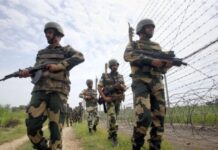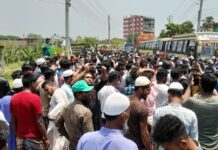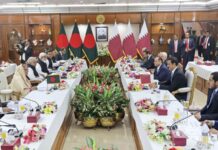Man sentenced to death over RP Saha murder

He has also been pronounced guilty in two other war crimes cases
The International Crimes Tribunal (ICT)-1 has sentenced Mahbub of Tangail to death, in a case filed over the murder of Danbir Roy Bahadur Ranada Prasad Saha, alias RP Saha, and his son Bhabani Prasad Saha during 1971’s Liberation War.
Justice Md Shahinur Islam, chairman of the three-member panel of ICT-1, pronounced the sentence on Thursday.
Mahbub has been found guilty in all three charges of crimes against humanity framed against him by ICT-1 on March 28, 2018.
The two other charges are: killing 33 Hindu people in Baimhati village – the ancestral home of RP Saha in Mirzapur of Tangail, and torturing 22 Hindu people in villages in Mirzapur and Narayanganj.
RP Saha’s family, who were present at the court, have expressed their satisfaction with the verdict.
“We have waited for justice for 48 years,” Srimati Saha, wife of RP Saha’s son Bhabani Prasad Saha, told the Dhaka Tribune. “We have found justice at last.”
Bhabani’s son and RP Saha’s grandson, Raju Prasad Saha, said the verdict has “taken a load off of his shoulders”.
Ranadash Gupta stood for the prosecution, while Gazi MH Tamim, was the defence counsel.
The defence counsel prayed for Mahbub’s acquittal, and said he would appeal against the verdict.
The date to deliver the sentence was fixed, through a short order, by the same panel on Wednesday.
Earlier on April 24, the ICT-1 put the verdict on CAV (curia advisari vult, a Latin legal term meaning the court awaits verdict), as both prosecution and the defence concluded their arguments on that day.
Also Read- ICT verdict in RP Saha killing case Thursday
On April 7, the prosecution concluded their part of arguments in the case.
Mahbub has been called a Razakar (Pakistani’s collaborators).
According to the charge framing order, Mahbub, 69, is accused of carrying out attacks in different areas of Tangail and Narayanganj, alongside his father and local Peace Committee chief Wadud Moulana and brother, Md Abdul Mannan.
On the same day, Mahbub, and his associates from the Razakar Bahini and Pakistani army, attacked Saha’s residence on Sirajdikhan Road of Khanpur in Naryanganj town.
There, they detained five, including Saha and his son Bhabani Prasad Saha, tortured them, and took them away. They never returned.
Mahbub was shown arrested in a case under ICT Act, 1973, on November 7, 2017.
The prosecution submitted the formal charge against the lone accused on January 11, 2018.
Who is Danbir Roy Bahadur Ranada Prasad Saha?
Ranada Prasad Saha is renowned for being a great philanthropist and a patron of women’s education. “Danbir”, the name given to show his philanthropist spirit, translates to “the hero benefactor”.
As part of empowering girls through education, he established the Bharateswari Homes in Mirzapur and also founded Kumudini Girls’ College in Tangail, and Debendra College in Manikganj.
In July, 1944, RP Saha donated of amount of Rs250,000 to the British Red Cross Appeal Fund, and in the early 50s he financed the construction of the Maternity Ward of Combined Military Hospital (CMH) in Dhaka.
When Lord Richard G Casey, the then Governor of Bengal, inaugurated a free-for-all, 750-bed hospital in Mirzapur, he named it Kumudini Hospital, after the name of Saha’s mother.
Saha was born in November 15, 1896, in Kachhur of Savar, near Dhaka. His father hailed from Mirzapur, and he was the second child of Debendranath Podder and Kumudini Devi. He had two brothers and one sister.
When Saha was 16, he fled to Kolkata, and initially worked as a day labourer, a rickshaw-puller, or even as a hawker. Later, at one stage, he was also involved in the nationalist movement or “swadeshi andolon”, to free Bengal from British imperialism.
When the World War I began, Saha joined the army and was posted to Bengal Ambulance Corps. After the war was over, he joined government service, retired in 1932, and started a business.
This great philanthropist’s spirit lives among his successors who are on the Board of Directors of the Trust. Saha was the first Managing Director succeeded by his daughter Joya Pati. His grandson Rajiv Prasad Saha is the present Managing Director of the Trust.









